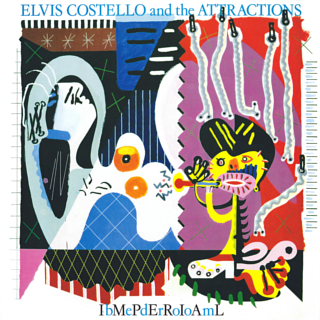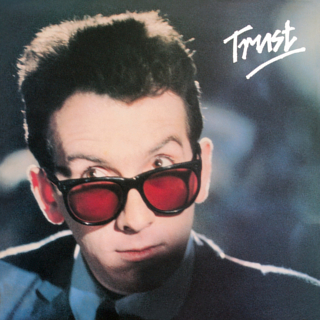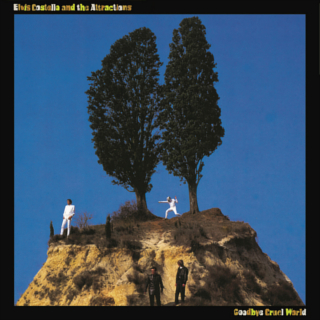
Imperial Bedroom is the seventh studio album by the English singer-songwriter Elvis Costello, and his sixth with the Attractions—keyboardist Steve Nieve, bassist Bruce Thomas and drummer Pete Thomas. It was released on 2 July 1982 through F-Beat Records in the United Kingdom and Columbia Records in the United States. Recording took place at AIR Studios in London from late 1981 to early 1982 with production handled by Geoff Emerick. Placing an emphasis on studio experimentation, the album saw the group use unusual instruments, including harpsichord, accordion and strings arranged by Nieve. Songs were rewritten constantly while Costello tinkered with the recordings, adding numerous overdubs.

Get Happy!! is the fourth studio album by the English singer-songwriter Elvis Costello, and his third with the Attractions — keyboardist Steve Nieve, bassist Bruce Thomas and drummer Pete Thomas. It was released on 15 February 1980 through F-Beat Records in the United Kingdom and Columbia Records in the United States. Produced by Nick Lowe and engineered by Roger Béchirian, the sessions began in London but moved to the Netherlands after Costello found the material derivative of his previous album, Armed Forces (1979). The sessions were problematic but resulted in a large number of songs; the final album contains 20 tracks across a single LP.

Punch the Clock is the eighth studio album by the English singer-songwriter Elvis Costello, and his seventh with the Attractions—keyboardist Steve Nieve, bassist Bruce Thomas and drummer Pete Thomas. It was released on 5 August 1983 through F-Beat Records in the United Kingdom and Columbia Records in the United States. Produced by Clive Langer and Alan Winstanley, the album was Costello's attempt at making a commercial record following years of dwindling commercial success. It was recorded at London's AIR Studios in early 1983 and features contributions from the TKO Horns and Afrodiziak.

Trust is the fifth studio album by the English singer-songwriter Elvis Costello, and his fourth with the Attractions—keyboardist Steve Nieve, bassist Bruce Thomas and drummer Pete Thomas. It was released on 23 January 1981 through F-Beat Records in the United Kingdom. Produced by Nick Lowe, with assistance by the engineer Roger Béchirian, the album was recorded in London from October to November 1980 between DJM and Eden Studios. The sessions were riddled with alcohol and drug issues and tensions were high between the band members. Squeeze's vocalist Glenn Tilbrook and the Rumour's guitarist Martin Belmont made guest appearances on "From a Whisper to a Scream".

Blood & Chocolate is the eleventh studio album by the English singer-songwriter Elvis Costello, and his ninth album with the Attractions—keyboardist Steve Nieve, bassist Bruce Thomas and drummer Pete Thomas. It was released on 15 September 1986 through Demon and Columbia Records. After mostly using outside musicians for his previous album King of America, Costello reunited the Attractions and his former producer Nick Lowe for Blood & Chocolate. Recorded in London during a period of heightened tensions between Costello and the Attractions, the tracks were recorded quickly, mostly live in first takes, while the band were set up simultaneously in the same room at Olympic Studios. The Pogues' bassist Cait O'Riordan guested on multiple tracks.

King of America is the tenth studio album by the English singer-songwriter Elvis Costello, released on 21 February 1986. Co-produced by Costello and T Bone Burnett, the album originated following a series of tours the two made under the name "the Coward Brothers". Recording took place in mid-1985 at various studios in Los Angeles, California, with a group of American session musicians dubbed "the Confederates". Selected by Burnett, they included Ray Brown, Earl Palmer and former members of Elvis Presley's TCB Band. Costello's regular backing band, the Attractions, were intended to appear on half of the album before poor sessions led to them appearing on only one track, "Suit of Lights".

"Oliver's Army" is a song written by English musician Elvis Costello and performed by Costello and the Attractions, from the former's third studio album Armed Forces (1979). The song is a new wave track that was lyrically inspired by the Troubles in Northern Ireland and includes lyrics critical of the socio-economic components of war. Costello had travelled to Northern Ireland and was influenced by sights of British soldiers patrolling Belfast. Musically, the song features a glossy production and a keyboard performance inspired by ABBA, creating a juxtaposition between the lyrics and music that both critics and Costello have pointed out.

Goodbye Cruel World is the ninth studio album by the English singer-songwriter Elvis Costello, and his eighth with the Attractions—keyboardist Steve Nieve, bassist Bruce Thomas and drummer Pete Thomas. It was released on 18 June 1984 through F-Beat Records in the United Kingdom and Columbia Records in the United States. Produced by Clive Langer and Alan Winstanley, who returned from 1983's Punch the Clock, the album was recorded at London's Sarm West Studios in March 1984 during a period of turmoil for the artist. The problematic sessions included disagreements between Costello and the producers over the album's direction and high tensions amongst the Attractions.

The Very Best of Elvis Costello and The Attractions 1977–86 is a compilation album by Elvis Costello and the Attractions, released in 1994.

The discography of the English singer-songwriter Elvis Costello includes 33 studio albums, 6 live albums, 17 compilation albums, 6 tribute albums, 2 extended plays, 62 singles and 4 box sets. This page distinguishes between United States and United Kingdom release dates and record labels. Of note are the reissue series, Costello's back catalogue having undergone reissue three times by three different companies.

"Man Out of Time" is a song written by new wave musician Elvis Costello and performed by Elvis Costello and the Attractions on their 1982 album, Imperial Bedroom. With lyrics detailing a political scandal, "Man Out of Time" features a lush arrangement that was a conscious departure from the aggressive style of Costello's previous work.

"New Amsterdam" is a song written and performed by new wave musician Elvis Costello on his 1980 album, Get Happy!! Written about the New World and New York, the recording of the song that appears on Get Happy!! was a demo that Costello had recorded in Pimlico.

"From a Whisper to a Scream" is a song written by new wave musician Elvis Costello and performed by Costello and the Attractions on their 1981 album, Trust. With lyrics referencing drinking, the song notably features a guest vocal from Squeeze frontman and songwriter Glenn Tilbrook as well as a guitar part from ex-Rumour guitarist Martin Belmont.

"Blue Chair" is a song written by new wave musician Elvis Costello and recorded by Costello with his backing band the Attractions. The song first appeared on Costello's 1986 album, Blood & Chocolate. First intended for Costello's previous album King of America, the song was scrapped during that session and reworked with the Attractions around Steve Nieve's piano part.

"13 Steps Lead Down" is a song written and performed by new wave musician Elvis Costello that was first released on his 1994 album Brutal Youth. Written quickly during a day-long session, the song features lyrics referencing El Escorial and the twelve-step recovery movement. The track is one of those on Brutal Youth that features the reunited Attractions, Costello's longtime backing band.

Now Ain't the Time for Your Tears is the debut solo album by English singer-songwriter and Transvision Vamp vocalist Wendy James, released on 8 March 1993 by MCA Records.
"Welcome to the Working Week" is a song written by and first recorded by Elvis Costello in 1977 for his debut album My Aim Is True. A sardonic comment on the working life aimed at a more privileged woman, the song features a brief runtime and unpolished production. Released as the B-side to "Alison", the song has since attracted critical acclaim from music writers.
"New Lace Sleeves" is a song written by new wave musician Elvis Costello and performed by Costello and the Attractions for his 1981 album Trust. The first version of the song was written by Costello in 1974 and featured post-war themed lyrics that were largely scrapped in the final recording. In the final version of the song, Costello included lyrics about seduction and power. Musically, the song was performed at a slower tempo and features a band performance praised by Costello. Pete Thomas notably performed a drum beat inspired by songs from Devo and Stevie Wonder.

"Watch Your Step" is a song written by new wave musician Elvis Costello and performed by Costello and the Attractions on their 1981 album, Trust. Originating from lyrics he wrote as a 20-year-old, "Watch Your Step" was inspired by Costello's experiences on tour as well as by dub music. The song was originally a louder rock song, but the final released version is slower and quieter.
"Suit of Lights" is a song written and performed by new wave musician Elvis Costello that was first released on his 1986 album King of America. Written about Costello's memories of his father, the song includes introspective lyrics about the "dubious embrace of celebrity" while also featuring the sole performance of the Attractions on the album, who were largely supplanted by the studio professionals of the Confederates on the rest of King of America.

















